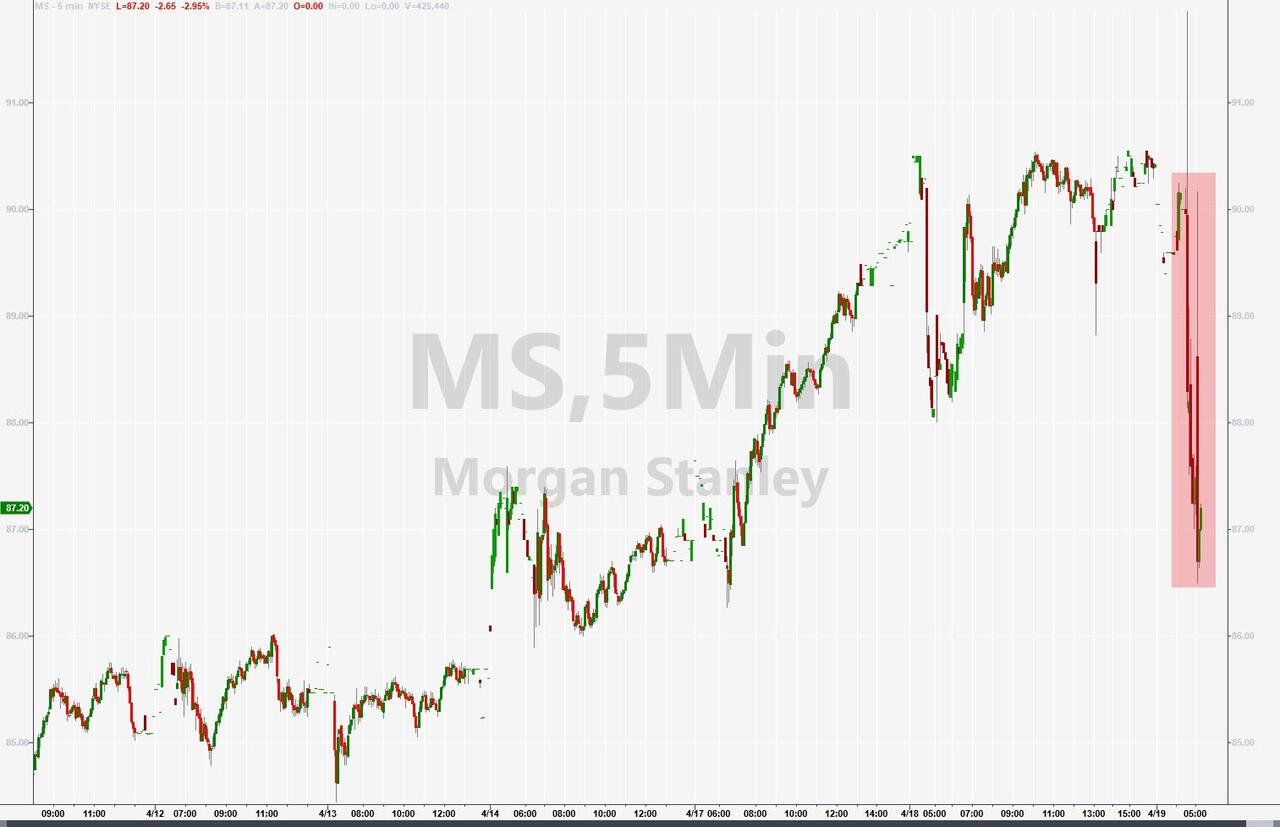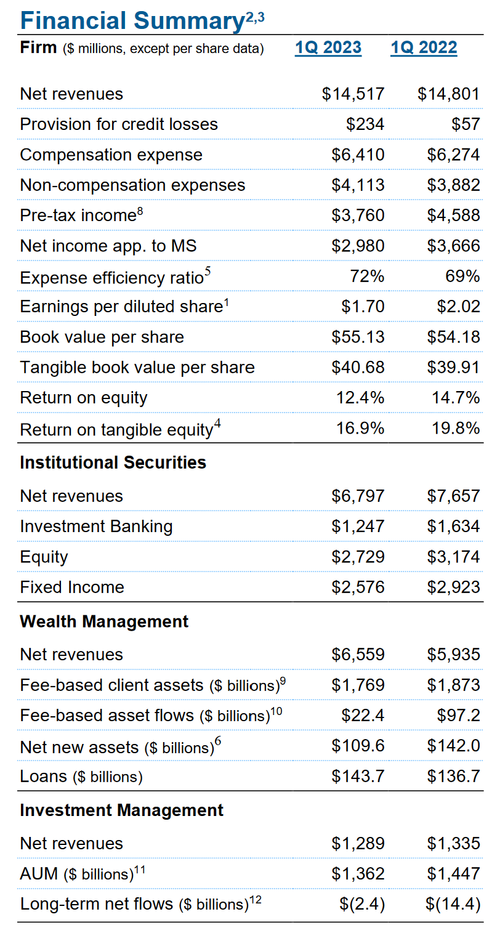Morgan Stanley Slides As Credit Loss Provisions Surge Due To Commercial Real Estate Exposure

Image Source: Pexels
On the surface, Morgan Stanley's earnings should have been strong enough to prompt a boost in the stock price: unlike its biggest competitor Goldman, which yesterday tumbled after reporting lousy Q1 numbers including a rare miss in FICC, MS not only beat across the board but also saw its investment bank generate stronger than expected results; even so, both revenue and profits dropped Y/Y, with net income down to $3.0 billion, or $1.70 per diluted share, vs net income of $3.7 billion, or $2.02 per diluted share, for the same period a year ago. Here is a summary of what the bank reported:
- EPS $1.70, beating estimates of $1.65
- Net revenue $14.52 billion, beating estimates of $14.07 billion, down from $14.8 billion Y/Y
- Wealth management net revenue $6.56 billion, +11% y/y, beating estimates of $6.48 billion
- Wealth Management pretax profit $1.7 billion, estimate $1.81 billion; wealth management pretax margin +26.1%, estimate +28%
- FICC sales & trading revenue $2.58 billion, beating estimates of $2.42 billion
- Equities sales & trading revenue $2.73 billion, -14% y/y, missing estimates of $2.86 billion
- Institutional Investment Banking revenue $1.25 billion, beating estimates of $1.12 billion
- Advisory revenue $638 million, -32% y/y, beating estimates of $544.6 million
- Equity underwriting rev. $202 million, -22% y/y, missing estimates of $219.9 million
- Fixed Income Underwriting revenue $407 million, -5.8% y/y, beating estimates of $356.6 million
- Wealth management net revenue $6.56 billion, +11% y/y, beating estimates of $6.48 billion
Here are several other notable numbers:
- Total deposits $347.52 billion, vs est $352.17 billion
- Non-interest expenses $10.52 billion, vs estimates of $10.12 billion
- Compensation expenses $6.41 billion, vs estimates of $6.07 billion
- Non-compensation expenses $4.11 billion, vs estimates of $4.09 billion
- Net interest income $2.35 billion, vs estimate $2.46 billion
- Effective tax rate 19.3%, estimate 22%
- Expense efficiency ratio 72%, estimate 72.4%
- Fee-based asset flows $22.4 billion, estimate $24.28 billion
Including key credit metrics:
- Book value per share $55.13
- Tangible book value per share $40.68
- Return on equity 12.4%, estimate 12.7%
- Return on tangible equity +16.9%, estimate +16.9%
- Standardized CET1 ratio 15.1%, estimate 15.1%
The bank also noted that Wealth Management attracted $110 billion of new assets during the quarter, leading to $6.6BN in net revenues, positively impacted by mark-to-market gains on "investments associated with certain employee deferred compensation plans compared to losses a year ago." The results "reflect higher net interest income versus the prior year primarily driven by higher interest rates, even as clients continue to redeploy sweep deposits. These results were partially offset by an increase in expenses as well as higher provisions for credit losses."
MS also said that its Investment Management results reflected net revenues of $1.3 billion on AUM of $1.36 trillion (vs $1.33 trillion exp) amid declines in asset values from a year ago.
And a few other notable comments:
- Compensation expense increased primarily driven by higher expenses related to certain deferred compensation plans linked to investment performance partially offset by lower compensation associated with carried interest
- Gorman says Equity and Fixed Income revenues were strong, but Investment Banking activity remained constrained
- Results reflect higher net interest income driven by higher interest rates, even as clients continue to redeploy sweep deposits. Results partially offset by an increase in expenses as well as higher provisions for credit losses
- Investment Management results reflect net revenues of $1.3 billion on AUM of $1.4 trillion amid declines in asset values from a year ago
So far so good, but what has spooked investors this morning and sent the stock price lower after an initial kneejerk higher, was the bank's admission that not all is well, specifically as relates to the "credit event bogeyman" du jour. To wit, Morgan Stanley revealed that it took a provision for credit losses of $234 million, more than double the estimated $99.1 million, and more than quadrupling the $57 in Q1 '22, and here's why:
Increases in provisions for credit losses were primarily related to commercial real estate and deterioration in the macroeconomic outlook from a year ago.
As a result, after briefly spiking above $90, MS stock has dipped as low as $86.5, which however is hardly a disaster as it represents a value seen just this Monday.
(Click on image to enlarge)

More By This Author:
Netflix Dumps'n'Pumps After Subscriber Miss; Slashed Forward GuidanceBank Of America Jumps On Blowout Earnings As Big Banks Feast On Small Bank Corpses
"It's Going To Be Ugly": Commercial Real Estate Predictions Turn Dire
Disclosure: Copyright ©2009-2023 ZeroHedge.com/ABC Media, LTD; All Rights Reserved. Zero Hedge is intended for Mature Audiences. Familiarize yourself with our legal and use policies ...
more



